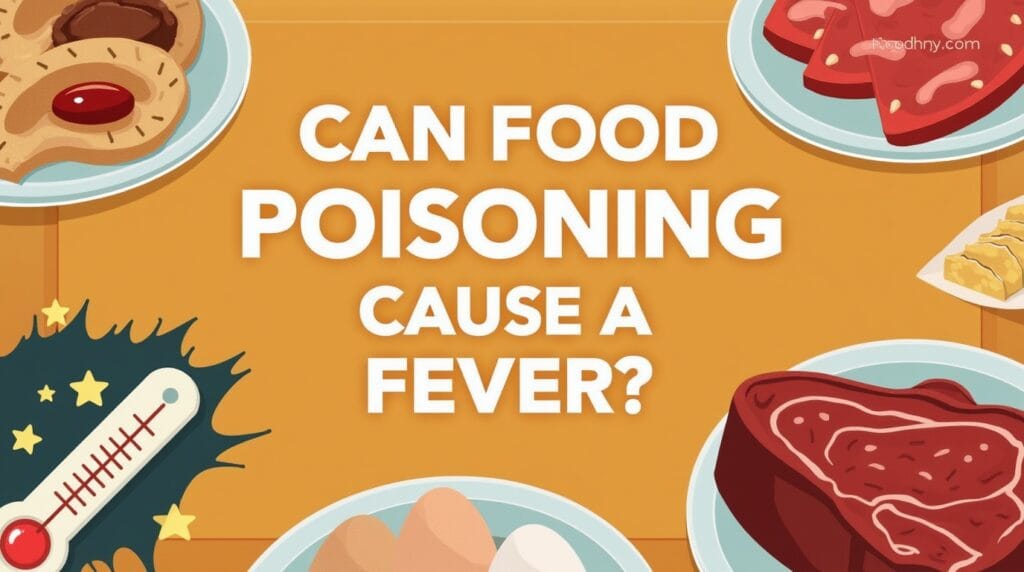5 Crucial Facts About Food Poisoning and Fever

Food poisoning is an illness caused by consuming contaminated food or beverages. Symptoms can vary widely depending on the type of contaminant, but one common question is whether food poisoning can cause a fever. The short answer is yes—fever can be a symptom of food poisoning, and it often serves as a sign that your body is fighting off an infection.
Table of Contents
What Is Food Poisoning?
Food poisoning occurs when food or drinks are contaminated with harmful bacteria, viruses, parasites, or toxins. Common culprits include:
- Bacteria: Such as Salmonella, Escherichia coli (E. coli), and Listeria.
- Viruses: Like Norovirus and Hepatitis A.
- Parasites: Such as Giardia and Cryptosporidium.
- Toxins: Produced by bacteria like Clostridium botulinum or Staphylococcus aureus.
The severity of food poisoning can range from mild discomfort to severe illness requiring medical attention. Symptoms often begin within hours to a few days after consuming contaminated food.
Why Does Food Poisoning Cause a Fever?
Fever is a natural response of the body’s immune system to infection. When pathogens like bacteria or viruses invade the body, the immune system releases chemicals that raise your body temperature. This elevated temperature helps slow the growth of harmful microorganisms and boosts the effectiveness of immune cells.
In the case of food poisoning, fever is more likely to occur if the illness is caused by bacterial or viral infections rather than toxins. For example:
- Salmonella: Often found in raw or undercooked poultry, eggs, and dairy, this bacteria can cause fever along with diarrhea, abdominal pain, and vomiting.
- Listeria: Commonly found in deli meats, soft cheeses, and unpasteurized dairy, Listeria infections often lead to fever, muscle aches, and sometimes severe complications like meningitis.
- Norovirus: This highly contagious virus can cause fever, nausea, vomiting, and diarrhea.
Other Symptoms of Food Poisoning
In addition to fever, food poisoning can cause a variety of symptoms, including:
- Nausea and Vomiting: Often the first signs of food poisoning, caused by the body’s attempt to expel the contaminant.
- Diarrhea: A common symptom that helps flush out harmful pathogens.
- Abdominal Cramps: These occur as your digestive system reacts to the infection.
- Fatigue and Weakness: Resulting from dehydration and the body’s effort to fight the illness.
- Headache and Muscle Aches: Sometimes accompanying fever as part of the immune response.
When to Seek Medical Attention
While mild cases of food poisoning often resolve on their own within a few days, certain symptoms may indicate a more serious condition requiring medical attention. These include:
- High Fever: A fever of 101.5°F (38.6°C) or higher in adults, or any fever in infants and young children.
- Severe Dehydration: Signs include dry mouth, dizziness, and infrequent urination.
- Persistent Vomiting or Diarrhea: Lasting more than three days or containing blood.
- Neurological Symptoms: Such as confusion, blurred vision, or difficulty breathing, which may indicate botulism or other severe infections.
- Pregnancy or Weakened Immune System: If you’re pregnant, elderly, or have a compromised immune system, you’re at higher risk for severe complications and should consult a healthcare provider.

How to Treat Food Poisoning and Fever
Treatment for food poison focuses on relieving symptoms and preventing dehydration. Here are some tips:
- Stay Hydrated: Drink plenty of fluids, such as water, clear broths, or oral rehydration solutions, to replace lost fluids and electrolytes.
- Rest: Allow your body to recover by getting plenty of sleep and avoiding strenuous activities.
- Use Over-the-Counter Medications: For fever, you can take acetaminophen or ibuprofen, but consult a doctor if you’re unsure.
- Avoid Solid Foods Initially: Start with bland foods like rice, bananas, and toast once vomiting or diarrhea subsides.
Preventing Food Poisoning
The best way to avoid food poison and its associated symptoms, including fever, is to practice safe food handling. Here are some key tips:
- Wash Hands and Surfaces: Clean hands, utensils, and countertops thoroughly before and after handling food.
- Cook Foods to Proper Temperatures: Use a food thermometer to ensure meats and poultry are cooked to the appropriate internal temperature.
- Store Food Properly: Refrigerate perishable items promptly and avoid leaving food out at room temperature for extended periods.
- Avoid Cross-Contamination: Keep raw meats separate from ready-to-eat foods.
Conclusion
Yes, food poison can cause a fever, particularly when it’s caused by bacterial or viral infections. While most cases of food poison resolve on their own, fever can be a sign that your body is actively fighting the infection. By staying hydrated, resting, and seeking medical attention when necessary, you can recover safely. Practicing good food hygiene is key to preventing food poison and its unpleasant symptoms, including fever.







